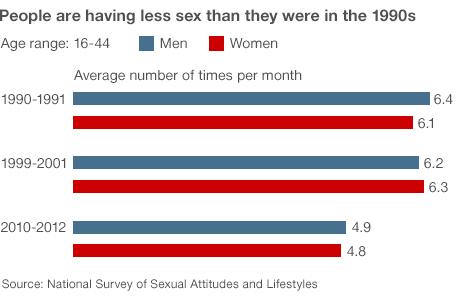Modern life 'turning people off sex'
- Published

More than 15,000 people were polled about their sex lives
Money worries and the distractions of social media mean people are having sex less frequently, researchers say.
A once-a-decade poll, external of 15,000 Britons found those aged 16-44 were having sex fewer than five times a month.
The figure compared with more than six times a month on the last two occasions when the official National Survey of Sexual Attitudes and Lifestyles was carried out, in 1990-91 and 1999-2001.
The study's authors say modern life may be having an impact on libidos.
Dr Cath Mercer, from University College London, said: "People are worried about their jobs, worried about money. They are not in the mood for sex.
"But we also think modern technologies are behind the trend too. People have tablets and smartphones and they are taking them into the bedroom, using Twitter and Facebook, answering emails."

She also said the survey suggested that couples aged 16 to 44 may be using online porn as a substitute for sex.
Men polled in 2010 to 2012 reported having sex 4.9 times a month and women 4.8. In both previous surveys the averages were more than six for both sexes both times.
The survey carried out by NatCen Social Research and analysed by researchers from University College London and the London School of Hygiene and Tropical Medicine also asked older people about their sex lives.
It found 42% of women and 60% of men aged 65 to 74 had had sex in the past year.
Nonetheless, they were the age groups having the least sex - 2.3 times a month for men and 1.4 for women.
Dr Cath Mercer: "If we think about the amount of sex that the population has, we've seen a decline in frequency"
Among men, the 25-to-34 age group were having the most sex - 5.4 times a month - and for women it was the 16-to-24 age group, 5.8 times.
The latest survey, which is carried out every 10 years, also shows the age at which people start having sex is lower in the younger age groups.
The average age for the under-25s is 16 compared with 19 for men and 18 for women in the 65-to-74 age group.
Among other findings:
One in six pregnancies in the UK is unplanned.
About half of men and women have had a recent sexual problem, but only a 10th of those interviewed were distressed or worried about their sex lives.
Lack of interest in sex is one of the most commonly reported problems, and one not confined to women - around 15% of men had experienced loss of libido.
Since the last survey in 2000 people have become more accepting of same-sex relationships but less tolerant of cheating spouses. For more about how attitudes have changed read more here.
The average woman aged under 44 said they had had 7.7 partners over their lifetime, while for men it was 11.7.
Some 3.6% of men had paid for sex in the last five years. Hardly any women had.
Genevieve Edwards, from Marie Stopes International, said: "A key insight from the survey is that people are having sex earlier and having children later, which means that, on average, women in Britain spend about 30 years of their life needing to avert an unplanned pregnancy, yet many are not being informed about or offered the full range of services.
"Long-acting contraceptives, for example, can be extremely effective and convenient but too many are never offered the choice."
But the poll - the full details of which have been reported in the Lancet - also revealed the extent to which people are forced to have sex against their will.
One in 10 women and one in 70 men said they had experienced it.
However, fewer than half had told anyone about it and even fewer (13% of women and 8% of men) had reported the crime to the police.
A selection of your comments:
- Published26 November 2013
- Published26 November 2013
- Published5 September 2013
- Published14 August 2013
- Published5 June 2013